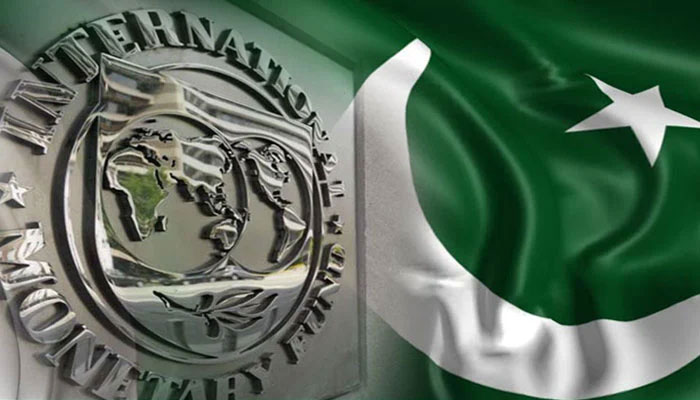Electronic asset declaration system: IMF to be given asset details of high-level public office-holders
The government has given a written commitment to the IMF for establishing an electronic asset declaration system to disclose details of assets possessed by high-level public office holders
ISLAMABAD: The government has given a written commitment to the IMF for establishing an electronic asset declaration system to disclose details of assets possessed by high-level public office holders, including cabinet members, parliamentarians and bureaucrats.
In the sent-out signed Letter of Intent (LoI) to the IMF’s Executive Board, the government has given an undertaking for continuation of Structural Benchmark (SB) for establishing a task force with inputs from international experts and civil society organisations to strengthen the institutional framework for an anti-corruption drive.
Pakistan and the IMF had agreed on the completion of the 6th Review under the PTI-led government that the government would take measures for strengthening the effectiveness of anti-corruption institutions.
Priority measures include the establishment of an asset declaration system with focus on high-level public officials (including federal cabinet members) by end-January 2022 (end-June 2021 SB, reset to end-January 2022), but it could not be implemented. It was also agreed for publication of the second review cycle report under the UN Convention against Corruption, and a review of the institutional framework for Pakistan’s anti-corruption institutions by independent experts with international experience.
The measures to strengthen governance and control of corruption remain crucial. Pakistani authorities committed with the IMF that their priorities include strengthening the effectiveness of anti-corruption institutions.
To further advance transparency, accountability and integrity in the public sector, Pakistan will issue regulations to establish an electronic asset declaration system (end-June 2021 SB, reset to end-January 2022) that is comprehensive (i.e. covering assets beneficially owned or located abroad), centrally-held with the Federal Board of Revenue, covering federal civil servants of Basic Pay Scale 17 to 22, accessible to entities authorized by law (including banks for the limited purposes of conducting customer due diligence as required for the provision of banking services) and effectively verified.
It will also institutionalise public access for annual declarations for all members (elected and un-elected) of the federal government cabinet of Pakistan. “We are undertaking the 2nd review cycle under the UNCAC implementation mechanism, and will publish the full report, including the findings, analysis and recommendations for improving the anti-corruption framework,” it said. A task force with inputs from reputable international experts and civil society organisations will complete a review of the institutional framework of anti-corruption institutions by end-December 2021 to enhance their independence and effectiveness in investigating and prosecuting corruption cases, with proposals for legislative amendments as appropriate, it added. However, the government could not deliver on the commitments and now the IMF wants to include it as a part of prior actions for the revival of its programme.
-
 'Elderly' Nanny Arrested By ICE Outside Employer's Home, Freed After Judge's Order
'Elderly' Nanny Arrested By ICE Outside Employer's Home, Freed After Judge's Order -
 Keke Palmer On Managing Growing Career With 2-year-old Son: 'It's A Lot'
Keke Palmer On Managing Growing Career With 2-year-old Son: 'It's A Lot' -
 Key Details From Germany's Multimillion-euro Heist Revealed
Key Details From Germany's Multimillion-euro Heist Revealed -
 David E. Kelley Breaks Vow To Cast Wife Michelle Pfeiffer In 'Margo's Got Money Troubles'
David E. Kelley Breaks Vow To Cast Wife Michelle Pfeiffer In 'Margo's Got Money Troubles' -
 AI-powered Police Robots To Fight Crime By 2028: Report
AI-powered Police Robots To Fight Crime By 2028: Report -
 Everything We Know About Jessie J's Breast Cancer Journey
Everything We Know About Jessie J's Breast Cancer Journey -
 Winter Olympics 2026: What To Watch In Men’s Hockey Today
Winter Olympics 2026: What To Watch In Men’s Hockey Today -
 Winnie Harlow Breaks Vitiligo Stereotypes: 'I'm Not A Sufferer'
Winnie Harlow Breaks Vitiligo Stereotypes: 'I'm Not A Sufferer' -
 Apple Martin Opens Up About Getting 'crazy' Lip Filler
Apple Martin Opens Up About Getting 'crazy' Lip Filler -
 Why Did OpenAI Remove One Crucial Word From Its Mission Statement?
Why Did OpenAI Remove One Crucial Word From Its Mission Statement? -
 Prince William Warned His Future Reign Will Be Affected By Andrew Scandal
Prince William Warned His Future Reign Will Be Affected By Andrew Scandal -
 Amy Madigan Reflects On Husband Ed Harris' Support After Oscar Nomination
Amy Madigan Reflects On Husband Ed Harris' Support After Oscar Nomination -
 Is Studying Medicine Useless? Elon Musk’s Claim That AI Will Outperform Surgeons Sparks Debate
Is Studying Medicine Useless? Elon Musk’s Claim That AI Will Outperform Surgeons Sparks Debate -
 Margot Robbie Gushes Over 'Wuthering Heights' Director: 'I'd Follow Her Anywhere'
Margot Robbie Gushes Over 'Wuthering Heights' Director: 'I'd Follow Her Anywhere' -
 'The Muppet Show' Star Miss Piggy Gives Fans THIS Advice
'The Muppet Show' Star Miss Piggy Gives Fans THIS Advice -
 Sarah Ferguson Concerned For Princess Eugenie, Beatrice Amid Epstein Scandal
Sarah Ferguson Concerned For Princess Eugenie, Beatrice Amid Epstein Scandal




